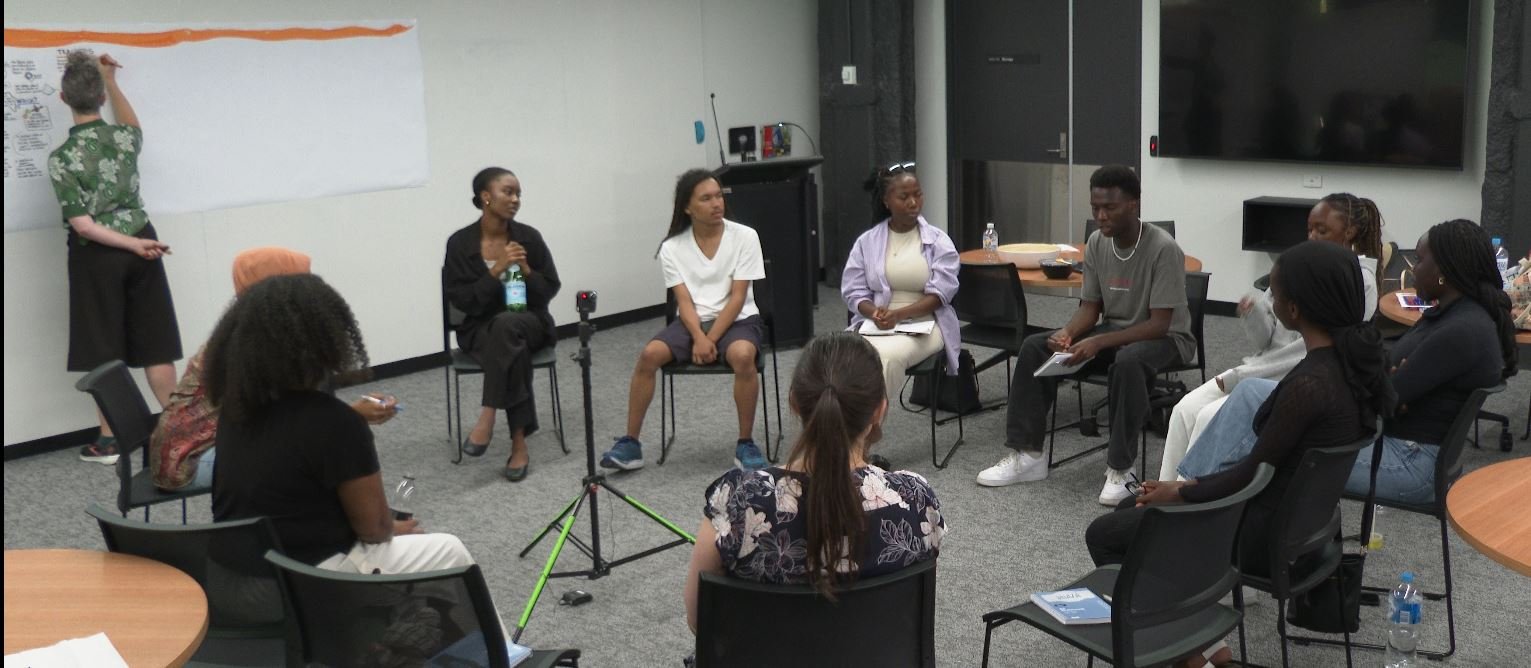Reflections on our project team workshop
By Habibat Ogunbanwo
Reflecting on my recent participation in the workshop for the African diaspora youth belonging project which took place from February 3rd to 5th, 2024, I am filled with a profound sense of accomplishment and excitement about the journey that lies ahead for our project. Over the three intensive days at the University of South Australia, 8 other youth co-researchers and I, along with the project lead, Dr Melanie Baak, critical friend Dr Denise Chapman and facilitated by Manal Younus embarked on a collaborative exploration of belonging for African diaspora youth in Australian schools.
Day One
On our first day, we dedicated time to engaging in group exercises from ice breakers to team-building challenges that elicited laughter. After all, a cohesive team dynamic was essential for the collaborative and intense workshop that lay ahead. After building a solid bond, each youth co-researcher shared key insights from their peer conversations. These peer conversations shed light on the lived high school experiences of our participants, with many discussing identity struggles, stereotypes and the challenges of reporting racism at school. After sharing these key insights, Max Harman, a graphic recorder, captured our thoughts as we distilled these themes into nine overarching categories that resonated closely with the experiences of all participants. These nine categories included: identity switching, reporting racism, stereotypes, curriculum representation, surveillance and monitoring, extra responsibilities, teacher dynamics, culture, religion and intersectionality and religion.
Youth co-researchers with Max Haman, graphic recorder
As our discussion progressed, defining belonging became a central focus. We quickly realised that it's a multifaceted word that holds different meanings for different individuals. For some of our participants, it meant safety and acceptance. To other participants, it was about being heard and seen for who they truly are. I think this realization was very crucial for our project because it allowed us to grasp the diverse and nuanced perspectives of each participant, therefore enriching our understanding beyond simplistic interpretations of the lived realities of African diaspora youth in Australian schools.
Intial themes identified by graphic recorder
Day Two
The second day of our workshop saw us exploring poetry, guided by the expertise and creativity of a published poet, Manal Younus, and with Dr Denise Chapman as a critical friend. Drawing inspiration from the themes identified during our analysis on the first day, we crafted poems that encapsulated our experiences from high school. After sharing some poems, we delved further into looking at ‘blackout poetry.’ Through this form of poetry, we were able to transform transcripts from the audio-recordings of conversations with our research participants into emotive verses that spoke volumes about the complexities and diverse nature of the lived experiences of our participants. As someone who doesn’t consider myself to be a “creative type,” the concept of ‘blackout poetry’ offered a refreshing, engaging and accessible entry point into artistic expression.
The workshop progressed into brainstorming creative ways to showcase our findings, recognising the importance of delivering our message in a manner that would resonate with our target audience: high school teachers. In a nod to contemporary trends, I suggested we ventured into the realms of TikTok trends, particularly the “I’m a ______, of course I’m_______” trend. This trend aims to sarcastically challenge stereotypes and misconceptions about race and identity. We saw an opportunity to adapt it to our context and use it as a tool in highlighting the lived experiences and realities of African diaspora youth in Australian schools with an example being “I’m an African Australian, of course, I feel comfortable talking to my white teacher about racism”.
In addition to the TikTok trend, we recognised the importance of creating more in-depth and impactful video content that would allow us to speak candidly and authentically about the experiences of African diaspora youth in Australian schools. To achieve this, we decided to produce a series of sit-down videos where we spoke directly to the camera. Most of the day was spent planning and scripting the various videos that we were planning to make the following day.
Day Three
Honestly, our final day was nothing short of inspiring. We had just spent the last 48 hours using every brain cell brainstorming, planning and refining our ideas and it was time to bring them to life. I can, hand to my chest, say confidently that every person poured their hearts and souls into every frame. We were all determined to create content that would inspire, educate and empower (we were also running out of time, but let’s ignore that. But as the Gen Z kids say these days, delulu is the solulu (solution)).
We spent time between recording aspects of the video for TikTok in different locations, and recording scripted content for the more serious videos in the UniSA Greenscreen room. As well as the scripted content, we also shared anecdotes and discussed challenges and barriers we had encountered and the ongoing impact of these experiences on our lives and identities. We also created a poem called “Bad Guy” which we recorded in the Greenscreen room. Through all the content we created, we were able to humanise our experiences, challenge stereotypes and most importantly in the process, advocate for positive change within educational spaces.
Despite the ticking clock as we wrapped up our workshop and bid each other farewell, I could not help but feel a profound sense of gratitude. Having participated in events like the Olympics, I believe I have experienced the epitome of human collaboration. Yet, this workshop surpassed even those remarkable events. My time together with all 8 youth co-researchers; Yahya, Elaine, Efon, Ben, Mwangaza, Jeanne, Shaza and Zamda, alongside Melanie, Manal and Denise, deepened my understanding of belonging but has also laid the groundwork for real and meaningful change within educational spaces. I am hopeful and excited to see the impact of our work as we continue to amplify the voice of African diaspora youth in Australia (and perhaps globally).





